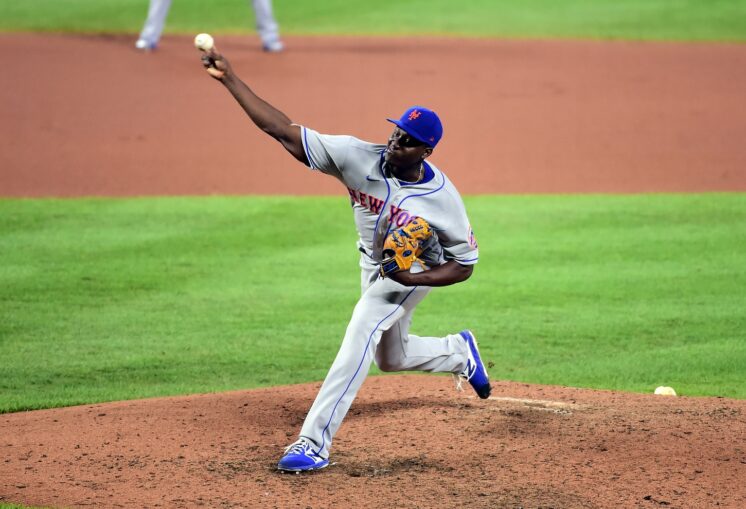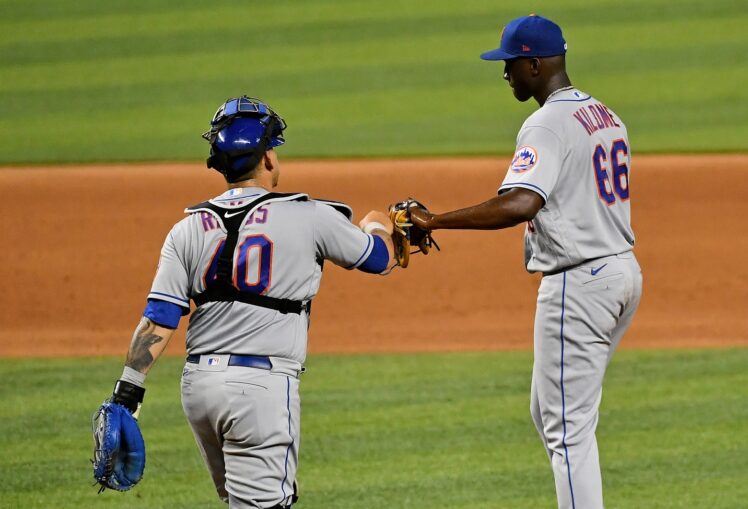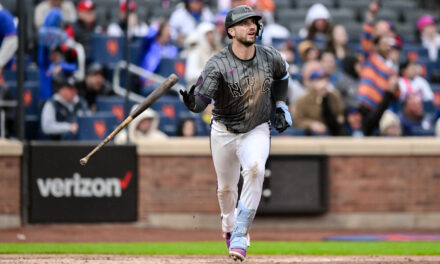
Evan Habeeb-USA TODAY Sports
Under normal circumstances, Franklyn Kilomé would be out of options heading into 2021, forcing the Mets to prematurely make him a permanent member of their pitching staff or risk losing him to another team on waivers.
Thanks to a little-known technicality in the rule, it should be another year until that decision has to be sorted out.
Kilomé, 25, was originally signed by the Philadelphia Phillies in January of 2013, though he didn’t make his professional debut for 16 months (that’s notable, as I’ll explain in a bit). He ascended fairly linearly up the minor league ladder before being traded to the Mets at the deadline in 2018 for Asdrubal Cabrera.
Because of when he signed, Kilomé, by then a top-10 Phillies prospect, was added to the 40-man roster in the winter of 2017 to protect him from the Rule 5 Draft — the fifth such draft since January 2013.
Getting added to the 40-man roster starts one of two “clocks” — a player’s service time clock, which only ticks while he’s in the major leagues or on a MLB injured list, or his option clock, which ticks when the player is sent to the minor leagues.
Instead of starting Kilomé’s service time clock (with just five games at Double-A at the time, he clearly was not ready for the majors), the roster move started his option clock. So when he spent all of 2018 back in Double-A — across two organizations — he used up his first option year.
In 99.99 percent of cases, players get three years in which they can be freely optioned to and recalled from the minors. In year four, that player is said to be “out of options” and has to clear waivers and be removed from the 40-man roster in order to be sent down.
General managers place an extreme importance on roster flexibility. Remember the confusion when Drew Smith, one of the Mets’ most effective relievers through the first three weeks of the season, was optioned three separate times in August?
It wasn’t through any fault of his own — he was one of the few players on the team who did have accessible options. He just happened to be the odd man out.
Back to Kilomé — The right-hander used his first option in 2018, both with the Phillies and Mets. Despite undergoing surgery for a torn UCL shortly after the end of the season, the Mets optioned him out of spring training in 2019. He spent the entire year injured, but still on option.
So entering 2020 with one option year left, Kilomé still had not pitched above Double-A. He was never given the chance to do so thanks to the pandemic, instead being forced to make his major league debut with 11.1 mop-up innings, some better than others.
Still, he used up his third and final option year, right? Is one of the organization’s top pitching prospects caught between a rock and a hard place heading into 2021?
Not exactly.

An exception to the Major League Rule that governs minor league options states that otherwise out-of-options players “who, prior to…the…season, have been credited with less than five seasons in the Major and Minor Leagues…shall be eligible for a fourth optional assignment during that season.”
Kilomé fits the description. While 2020 was his eighth season in professional baseball, it was remarkably only his fourth “credited season,” defined by spending at least 90 days on a major or minor league active roster.
Kilomé didn’t pitch in 2013, so he was never on an active roster. He spent 2014 and 2015 in the Gulf Coast and New York-Penn leagues, respectively. The regular seasons in those leagues don’t even span 90 days, so it’s impossible for a short-season player to accrue a “credited season.”
Kilomé picked up his first three credited seasons in 2016, 2017, and 2018, the latter overlapping with his first option year. In 2019, he spent the entire season on the injured list at Double-A Binghamton while recovering from Tommy John surgery. Time spent on an injured list only counts toward a credited season if the player was active for at least 30 days prior. By that definition, 2019 was not a credited season for Kilomé.
So entering this year, Kilomé had three credited seasons and one option year left. While it isn’t clear how the 67-day 2020 season will be handled when applying this rule, it won’t matter in Kilomé’s case. He’s still heading into 2021 with less than five credited seasons (either three or four) and no minor league options left.
In that case, he should be credited with a fourth minor league option and will have the opportunity to further develop in the minor leagues in 2021 without causing concern over losing him on waivers.
Almost always, the players who qualify under this rule are ones who shoot through the minor leagues and make their MLB debuts in less than 2-3 years after their first professional contract. Unusual career paths like international amateurs who sign MLB contracts or extremely MLB-ready draft prospects tend to fall under this category, though if they reach the majors that quickly they’re typically too good for the minors and don’t even use up three options in the first place.
Kilomé has long had potential as a major leaguer, though it’s now more likely to be actualized as a reliever than as a starter. Either way, having an accessible option in 2021 will allow him to continue to work on his craft in Triple-A, and join the major league team when necessary to prove his worth before he is truly out of options in 2022.















